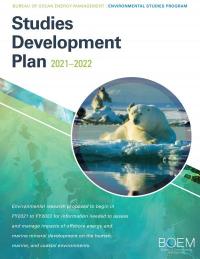As part of the Bureau of Ocean Energy Management’s (BOEM) commitment to acquire and use the highest quality scientific information in its decision making, the bureau has released its FY 2021-2022 Studies Development Plan (SDP).
The SDP is a key component of BOEM’s rigorous planning, review and procurement process to meet the nation's research needs for Outer Continental Shelf (OCS) environmental assessments. BOEM’s Environmental Studies Program (ESP) prepares the annual SDP to cover a two-year planning period. The plan outlines BOEM’s research priorities and includes brief study profiles that describe proposed studies for the upcoming fiscal year and for one successive year. These studies are designed to collect the information necessary to meet the needs of the users, including BOEM scientists, rule writers, modelers, and decision makers. Proposed studies are evaluated for program relevance, programmatic timeliness, and scientific merit.
BOEM maintains a complete description of ongoing BOEM studies by region. Each listing describes the research being conducted, the scientific discipline, the institution performing the work, the cost of the effort, time frame, and any associated publications, presentations, or affiliated web sites.
BOEM’s Meeting with the National Academies Committee on Offshore Science and Assessment
July 7 - 8, 2020
On July 7 - 8, 2020, the National Academies of Sciences, Engineering, and Medicine (NAS) will hold the 13th meeting of the BOEM Standing Committee on Offshore Science and Assessment (COSA) to showcase and provide feedback on BOEM’s recently released FY 2021-2022 Studies Development Plan (SDP). The meeting will be an online event open to media and the public. The Academies require advance registration. Meeting details, including a webcast link, will be posted to the NAS website.
BOEM has selected nine profiles from the SDP to present to COSA:
Gulf of Mexico Region
- A Demographic Analyses Update to “Air Quality Modeling in the Gulf of Mexico Region,” Cholena Ren and Victoria Phaneuf
Alaska Region
- Bowhead Whale Migration Patterns along the Alaskan Beaufort Shelf During a Period of Rapid Environmental Change, Heather Crowley
- Coastal and Submerged Historic Properties and Pre-contact Sites on the Alaska Outer Continental Shelf, Jeffrey Brooks
Office of Renewable Energy Programs
- Bioenergetic Model for North Atlantic Right Whales, Kyle Baker
ESP Headquarters
- Environmental and Human Exposure to Technologically Enhanced Naturally Occurring Radioactive Materials (TENORMs) Associated with Oil and Gas (O&G) Activities in the Outer Continental Shelf (OCS), Stephanie Sharuga, Andrew Remsen, and Mark Mueller
- Facilitating Strategic Partnerships in Support of the Presidential Memo on Ocean Mapping, Exploration, and Characterization, Mark Mueller and Jeremy Potter
- Socioeconomic Impacts Likely to Result from Initial Oil and Gas Projects in Frontier Areas, Kristen Strellec, Laura Mansfield, and Kim Marshall Mclean
Marine Minerals Program
- Application of a Morphodynamic Model to Assist in Planning the Long-term Restoration and Maintenance of the Louisiana Barrier Island System, Barton Rogers and Ana Rice
- Shallow-water Geophysical Mapping by Autonomous Underwater Vehicle(s): Feasibility Assessment, Field Testing, and Best Practice, Geoffrey Wikel and Jeffrey Waldner
BOEM consults with COSA as a source of independent, scientifically credible and objective information on topics of interest for the environmental studies and assessment activities. Collectively, these inputs contribute to the development of research plans.
BOEM’s Environmental Studies Program develops, funds, and manages rigorous scientific research specifically to inform policy decisions on the development of energy and mineral resources on the Outer Continental Shelf. Research covers physical oceanography, atmospheric sciences, biology, protected species, social sciences and economics, submerged cultural resources and environmental fates and effects.


